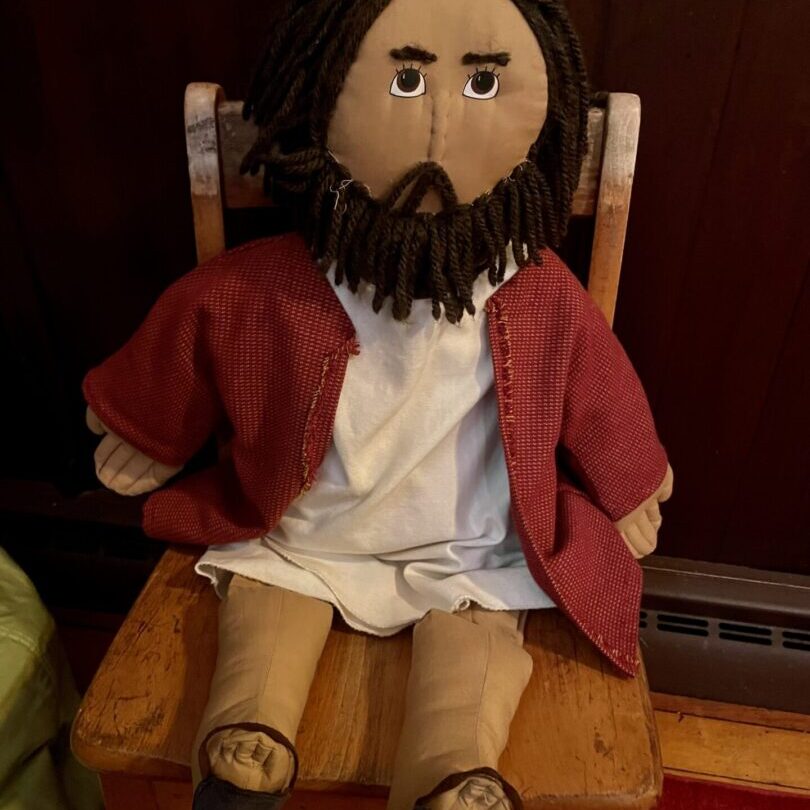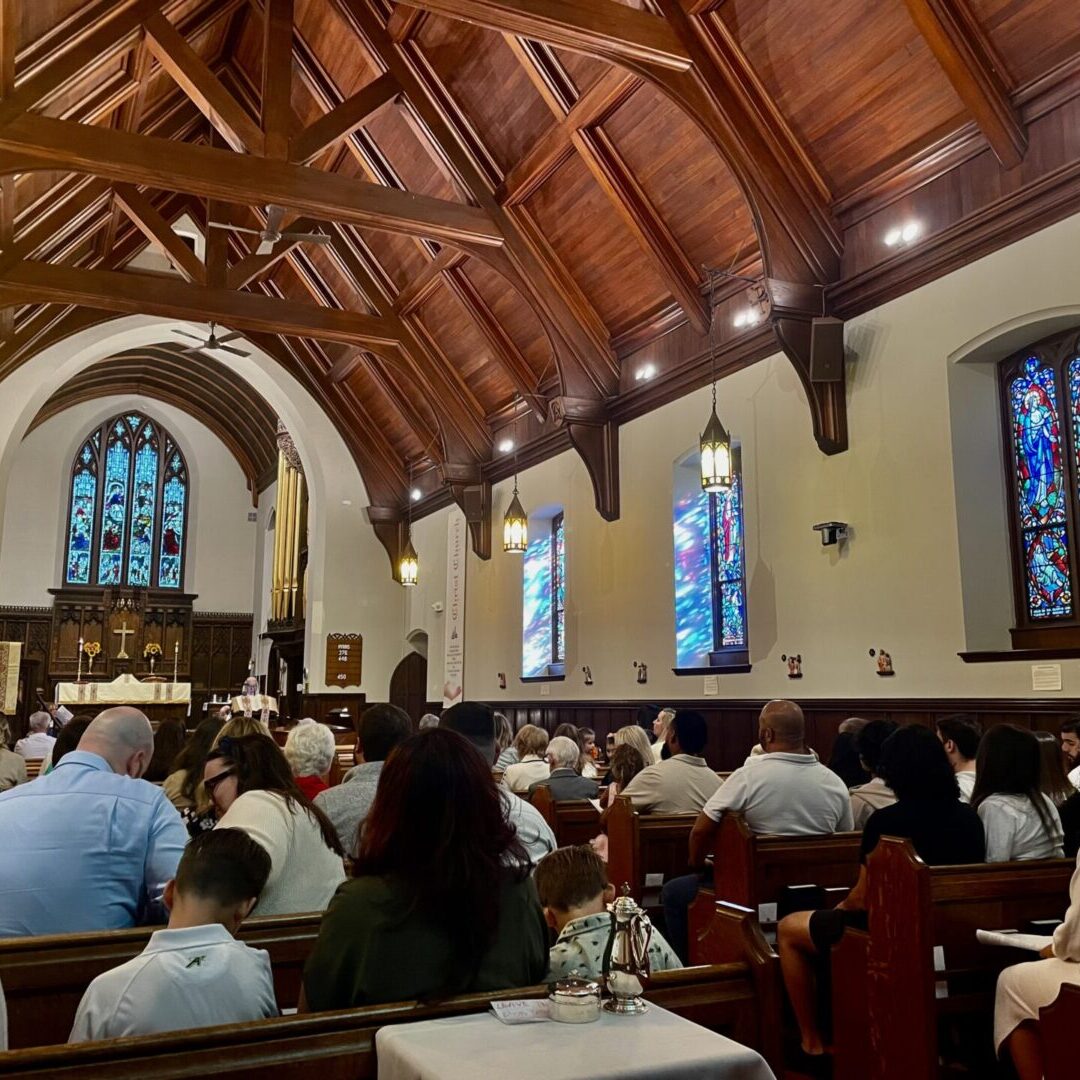
Embrace the Gift of Holy Baptism
Holy baptism is a sacred initiation through water and the Holy Spirit into Christ’s body, the church. In this rite, God forms an unbreakable bond with each person, adopting them as members of the church and heirs of the Kingdom of God (Book of Common Prayer, pp. 298, 858). At Christ Church, we celebrate this important spiritual milestone, nurturing a community of love and faith through our welcoming church services.
Participating in the New Life
We receive the great gift of forgiveness and are changed by the Holy Spirit through baptism. This cornerstone of our faith journey lays the groundwork for our future involvement in the church. One or more sponsors (godparents) provide each candidate with loving support as they work to strengthen their relationship with Christ and mentor them in their spiritual development.

The Significance of Baptism
The Importance of Community in Initiative
Role of Sponsors
Sponsors, or godparents, play a vital role for candidates who are infants or young children, acting as their advocates during the presentation and examination of the candidates. They embrace the responsibility of nurturing the candidates' spiritual growth and guiding them lovingly on their faith journey.
Congregational Commitment
During this sacred rite, our entire congregation comes together to promise support for the candidates in their life in Christ. We renew the baptismal covenant, creating a meaningful bond as we witness this special moment. The ritual involves the gentle use of water, administered by immersion or pouring, as each candidate is welcomed in the name of the Father, the Son, and the Holy Spirit. Marked with the sign of the cross, they are sealed by the Holy Spirit and embraced as cherished members of our faith community. Following the ceremony, we joyfully celebrate the newly initiated during the Eucharist, welcoming them with open hearts.
The Importance of Infant Baptism
A Commitment to Christ
Infants are baptized to embrace the blessings of the Covenant, membership in Christ, and the redemptive grace of God. In this cherished ceremony, parents or sponsors make heartfelt promises on behalf of the child, vowing to raise them within the church and guide them in their understanding of Christ's teachings.
Celebrating Sacred Moments in Faith
This sacred rite is particularly significant during meaningful occasions such as the Easter Vigil, the Day of Pentecost, All Saints' Day, and the Feast of the Baptism of our Lord. Each of these moments serves to illuminate the joy of new beginnings in faith and community.
Foundations and Commitments
Glossary Acknowledgment
Definitions provided courtesy of Church Publishing Incorporated, New York, NY (all rights reserved) from “An Episcopal Dictionary of the Church, A User-Friendly Reference for Episcopalians,” Don S. Armentrout and Robert Boak Slocum, editors.
Foundation of Baptism
In the Episcopal understanding, baptism is the foundation for all future church participation and ministry. This means that being a regular attendee and supporter of the parish is essential. To be invested in the church is to engage actively in its ministry and mission.
Expectations
Our expectations of baptism at Christ Church align with those of the wider church. To be baptized here, you and your family must be committed to God’s ministry, specifically through your involvement at Christ Church. You, your spouse, and your sponsors make a vow to actively raise your child within the church community.
Pledge of Support
We commit to nurturing your child’s spiritual journey. Members of our community pledge to support the parents and sponsors in this vital responsibility.
Baptismal Vows
Celebrant: Will you be responsible for seeing that the child you present is brought up in the Christian faith and life?
Parents and Godparents: I will, with God’s help.
Celebrant: Will you, by your prayers and witness, help this child grow into the full stature of Christ?
Parents and Godparents: I will, with God’s help.
Celebrant: Will you, who witness these vows, do all in your power to support these persons in their life in Christ?
People: We will.
Different Verses of Baptism
The Episcopal Church
From the Episcopal Library, “This is full initiation by water and the Holy Spirit into Christ’s body, the church. God establishes an indissoluble bond with each person in baptism. God adopts us, making us members of the church and inheritors of the Kingdom of God (BCP, pp. 298, 858). In baptism, we are made sharers in the new life of the Holy Spirit and the forgiveness of sins. Baptism is the foundation for all future church participation and ministry.”
The Apostle Paul
The Apostle Paul profoundly enriches our understanding of baptism through his letters, emphasizing its deep spiritual significance. He reminds us that in baptism, we are united with Christ in his death and resurrection: “Do you not know that all of us who have been baptized into Christ Jesus were baptized into his death? Therefore, we have been buried with him by Baptism into death, so that, just as Christ was raised from the dead by the glory of the Father, so we too might walk in the newness of life” (Romans 6:3–4). This passage signifies baptism as an invitation to leave behind our old ways and embrace a renewed life in Christ.
Early Christianity
For the early Christian community, baptism symbolized spiritual conversion and renewal-the transition from an old life to a new one in Christ. Through metaphorical imagery of death, burial, and resurrection, baptism illustrated the journey of dying to destructive behaviors and being reborn into a Spirit-led life. It served as an outward sign of the inner transformation God works in us, reflecting our spiritual journey toward communion with God and the community of faith.
Images of Conversion in Christian Baptism
While the metaphor of being raised from death to new life stands as a central image of Christian baptism in the New Testament, it does not fully capture the depth of one’s conversion and spiritual renewal. The early Christian community employed various other images and metaphors to express their transformative experiences through the Holy Spirit. These include:
- Spiritual Rebirth (John 3:3–10)
- Spiritual Awakening (Romans 8:37–39)
- Initiation Into the Body of Christ (1 Corinthians 12:12–13)
- Transformation of the Whole Person (Romans 12:1-2)
- Made a New Creature (2 Corinthians 5:17)
- Turning from Darkness to Light (Ephesians 5:8; Colossians 1:11–14)
- To Be Saved (Titus 3:3–7)
The Question of Baptism for Children
A key question surrounding baptism is whether infants or children should be baptized automatically or at a specific age. This question has evolved throughout history, reflecting changes in religious thought and practice.
Historical Context of Children in Baptism
Jewish Cultural Attitude
In Jewish culture, children were held in high regard, with a strong emphasis on their education and spiritual formation. Religious education was not merely about instruction but involved active participation in rituals.
Apostolic Church Practices
In the early Apostolic Church, children of believing parents were considered part of the Christian community. Their participation in rituals, especially within Jewish Christianity, was likely assumed, while practices among Gentile Christians varied.
Key Developments in Baptism
Council of Nicaea (325 C.E.)
As Christianity spread geographically, bishops visited congregations less frequently. The Western Church began to separate baptism from the final anointing and laying on of hands, which became known as confirmation. During this time, infant baptism became an established practice, with communion still administered to all baptized individuals, including infants. Concerns arose regarding infants' ability to consume bread, leading to the custom of administering only wine to them.
13th Century Changes
By the 13th century, it became more common for the laity to receive only the bread during communion, and the practice of communicating with infants started to decline.
Thomas Aquinas (1265 C.E.)
Commissioned by the Pope, Thomas Aquinas created a liturgy that eliminated communion for children, asserting that genuine devotion was required for participation. This further reinforced the idea that children should wait until they reach an age of discretion before receiving communion.
14th–15th Century Developments
During this period, a pontifical requirement emerged, stating that children must wait until the "Age of Discretion" to receive communion, although this age was never specifically defined.
The Council of Trent (1545–1563)
This council affirmed that early Church fathers did not view communion for children as essential for salvation. Consequently, receiving communion before the Age of Discretion became considered anathema. In contrast, Eastern Orthodox Churches maintained their practice of infant communion, while English bishops began to associate an intellectual understanding of faith with the necessity for confirmation before communion.
19th Century Perspectives
In the 19th century, church scholars adopted a neutral stance, recognizing that while there was no explicit prohibition against administering Holy Communion to infants, there was also no command to do so.
Modern Understanding
The 1979 Book of Common Prayer revitalizes the ancient Christian understanding of Holy Baptism within the liturgical life of the Church. It emphasizes that baptism is the initiatory rite of the Christian community. According to the Catechism, “Holy Baptism is the sacrament by which God adopts us as his children and makes us members of Christ’s Body, the Church, and inheritors of the kingdom of God.”
Children, Baptism, and Holy Communion
Importance of Infant Baptism
Catholic Christians embrace the practice of baptizing infants not out of fear for their salvation, but to incorporate them into the Body of Christ and affirm their identity as God’s own. Since the grace of both baptism and holy communion flows from God, it is not dependent on the recipient's understanding. Therefore, children who are baptized require the spiritual nourishment provided by the Christian community's family meal.
Commitments in Baptism
Commitments to live the Christian life are made in baptism. For infants and young children, sponsors (parents and godparents) make these promises on their behalf, vowing to support their spiritual growth. Consequently, sponsors must be educated in the meaning of baptism and their responsibilities within the church.
The Role of Godparents
Choosing godparents is a serious commitment, historically tied to the guardianship of the child should the parents pass away. This expectation remains today, emphasizing the importance of thoughtful selection.
Community Involvement in Baptism
The Prayer Book stipulates that Holy Baptism be conducted during the Eucharist, ensuring that the community is present to welcome and support the new member of the Household of Faith. Private baptisms are generally discouraged, except in emergencies.
Traditional Baptismal Days
Traditional baptismal days in the Christian year are preferred, including the Easter Vigil, Pentecost, All Saints’ Day, the Feast of the Baptism of our Lord, and the Visitation of the Bishop. Baptisms should ideally be scheduled for these occasions, with preparation for parents and godparents beforehand.
Reconsidering the Term “Christening”
Many clergy avoid the term “christening” due to its connotations and the misconception that it symbolizes a private, informal gathering. The word literally means "en-Christing," reflecting the sacrament’s true significance, which unites individuals with Christ’s death and resurrection. While joy and celebration are appropriate, the event should not be trivialized.
Expectations
To be baptized at Christ Church, families must commit to the ministry of God through the church. This commitment is essential in determining whether the community is the appropriate setting for raising the child "in the knowledge and love of the Lord."
Scheduling Baptisms
Priests do not schedule baptisms on demand; they assess whether the parents intend to raise the child within the community of faith. It may not be suitable for a child to be baptized at a grandparent's parish, particularly if the parents have not yet made their own commitments to the church.

Strengthening Community Through Faith
At Christ Church, we believe in the power of unity in worship and the importance of coming together as a community of faith. If you have questions about baptism or how to foster your child's spiritual journey, feel free to connect.

